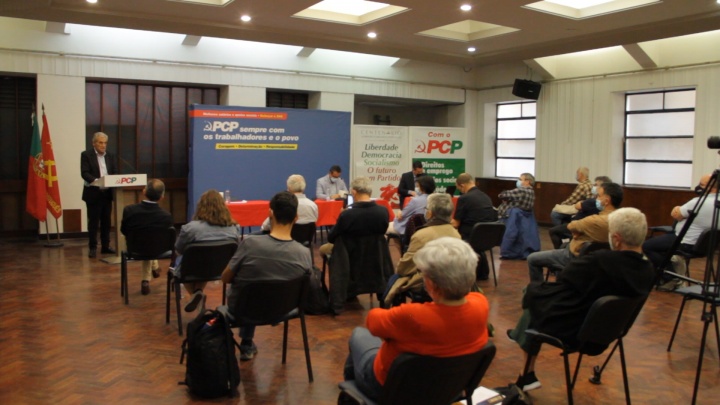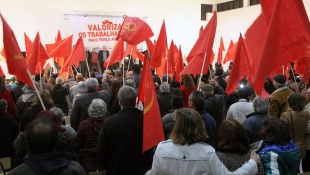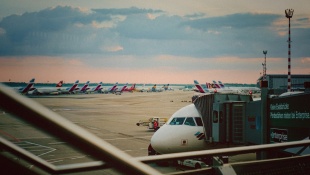The starting point today is the national railway sector, its strategic character and the need to make the necessary investments for its modernisation and expansion. But we are here to talk about many more things, in concrete, to use this example as an illustration of the much that needs to change in Portugal if we want to tread the path of development and progress.
To face an economic and social crisis like the one underway requires emergency measures, but it is also the time to correct strategic errors and break with a course that has neglected productive activities and deepened external dependence.
This is the time to look seriously at those that are the main national liabilities and bottlenecks, but also to observe the existing resources and potential and redirect the national economy towards a policy of replacing imports with national production. We are faced with the realisation of the obvious: a country that does not produce has no future. The PCP wants the obvious to be done: to get Portugal to produce.
Among the various existing needs we point out four fundamental areas for the development of national production that are simultaneously linked to the rupture with four large chains of external dependence that urgently have to be reversed, namely the production of food, the production of medicines and medical equipment, the production of energy and the production of transport means and material.
Today, the need to bet on the railroad is becoming consensual. Fortunately! But before we go any further, let us dwell on a question: and why has there been disinvestment in the last 30 years? Why were more than a thousand kilometres of tracks closed? Why was national rolling stock allowed to deteriorate?
Why was national train production stopped? Why was CP-Portuguese Railways pulverised? Why was so much building knowledge lost? So many questions that could be asked, always with the same answer: because PS, PSD and CDS have all along this time adopted right-wing, anti-patriotic policies, following the directives of the European Union and the precepts of neoliberal ideology - liberalisation, competition, privatisations.
Now, many people have already discovered that Portugal can and should again produce trains - the government has already talked about it, the CP chairman has already talked about it and there is even a national railway cluster. But 20 years ago, at the doors of Sorefame, fighting to stop it being shut down, there were the workers, the population of Amadora and the PCP. And when at that same time we presented concrete proposals that would have prevented the destruction of Sorefame, they were completely ignored, either by the governments that came later of PSD/CDS of Durão Barroso and Santana Lopes, or the PS government of José Sócrates.
Even today, there is a lot of talk, but very little continues to be done. There are two tenders running for the purchase of trains. None of them were designed to leverage national production. It is clear that we value the fact that, after 20 years without purchasing any train, tenders are taking place to acquire 14 units for Lisbon Metro and 22 units for CP. But we have to denounce that in this way we are not going to rebuild the national productive apparatus. First of all, because these tenders do not require national incorporation. Then because they are small in size, when what would be necessary would be to launch tenders for long series with phased deliveries over time that would allow to ensure work on a continuous basis over the years.
Of course, for this to be possible, it is necessary to plan national development in an integrated manner. It is necessary that investment in railway infrastructure be considered at the same time as investment in rolling stock. It is necessary that investment in rolling stock be planned for the medium and long term, and structured in order to serve the concrete aim of developing the national productive apparatus. It is necessary that the training of railway technicians - which is only done on the ground and in practice - is a priority in a policy of valuing work and workers. Priority should be given to replacing imports with domestic production
We have already said several times that in Portugal there is confusion between making many plans and the necessary planning of the economy. In fact, plans have never been lacking.
But they are almost always mere propaganda actions that never got off the ground and were replaced by other announcements and other plans.
But, in fact, economic development is rarely planned, the productive lines we want to develop are rarely pointed out and the necessary resources allocated to them. Instead, right-wing policy governments use the plans to make propaganda and then release a few million euros, which as a rule end up in the coffers of different economic groups, both national and increasingly foreign.
In other words, it is necessary to do the exact opposite of what has been done! It is necessary to combat the liberalisation and commodification of this sector, to rebuild CP as the public, single and national company for the entire railway sector, ending this aberration that is the joining of the management of the railways with the roads within the so-called Infrastructures of Portugal. In fact, we already have a good example here: EMEF was reinstated in CP two years ago and the results are recognised as positive.
Today, the PCP presents here a proposal to the Portuguese people to mobilise the necessary resources and means so that in Portugal trains can be produced to respond not only to the needs of fleet renewal that will arise in the coming years, but also to its modernisation and expansion. A proposal that allows us to build in Portugal what we are being forced to buy abroad.
Our proposal is therefore based on three fundamental axes, which other comrades here will develop:
1. rebuild a single command to the national railways sector (reconnect the wheel to the rail, as the railwaymen say);
2. really bet on the railway sector as a strategic sector for the mobility of people and goods and for the improvement of the environment and quality of life;
3. make use of the volume of investment needed to rebuild national production of rolling stock.
We believe that in the next fifteen years the volume of investment required in rolling stock will be around 3.75 billion euros, about 250 million per year. It seems and is in fact a lot. We could truly say that it is less than what the country handed to big capital in the processes of Novo Banco or BPN. We could say, equally truly, that public-private partnerships will cost five times more in the same period. But we prefer to underline that with this investment, if the State does not limit itself to go shopping to the market and instead bet on the reconstruction of the national productive capacity, it will contribute for an important part of it to reproduce economically, generating thousands of jobs and wealth in Portugal, besides allowing in the long run to reduce the costs of this investment in our Country.
It is a 15-year investment that will enable to respond to three essential lines:
1. replace the current national fleet for heavy passenger rail transport, which is aging as a result of the disinvestment of the last thirty years;
2. enable to increase the offer of rail passenger transport where this is necessary;
3. profit from the set of investments in infrastructure that are underway, that are planned or can be planned.
For the PCP, the investment that is being made in the national railroad, being insufficient, cannot and should not be to watch German, French or Spanish trains go by.
This investment that we propose, will allow us to solve multiple objectives: increase the offer on urban trains on all current lines, replace the Cascais fleet and create new urban services to Leixões and on the Western line; respond to a refurbished and expanded offer in the CP Regionals, enhancing the electrification of the Algarve, Minho, Western and Alentejo Lines, once again serving the Southern Line with Regionals, modernise the offer on the Douro Line, in the North, in Beira Baixa, in Alfarelos, in Tomar, in the East; improve the Intercities offer, assuming the objective of providing fast, direct and flexible capacity connections, with great comfort and complementary services such as cafeteria or transport of bulky luggage and bicycles; replace and expand the Alfas fleet, giving full use to the new Lisbon-Porto link; rebuild and extend international connections, including in the high-speed lines.
It is a significant investment but for which there are sufficient resources, both within the framework of the so-called Recovery and Resilience Plan and the Community support frameworks, or within the framework of the State Budget, or through other funding possibilities for productive investments. It is all a matter of choice as to where public investments are placed and where national resources are channelled. Big capital and its representatives shout that what is needed is to give them the money so that we all become richer. We reaffirm that public investment must serve to satisfy national and collective needs, and not to fatten the bank account of some.
With an important advantage that we want to highlight here: the government and the European Union place great emphasis on the need to decarbonise and carry out the energy transition. Much could be said about this, but this will be in another initiative. But one thing is certain: betting on the railroad and public transport is the measure that most contributes to decarbonisation and to energy transition, with the advantage that, if properly planned, it also contributes to the development of the national productive apparatus and to improve the mobility and quality of life of the populations.
The speeches that will follow will detail the central aspects of the proposal that we present here today. But allow me to emphasise this aspect again. A long time ago, too many years ago, some began to look at the industrial reality of our country as a matter of the past. At PCP, we look at the industry, the concrete manufacturing industry, as a matter of the future. And if the future of mobility depends on rail transport, then let us take the destiny of our country into our hands. Producing in Portugal the trains we will need in the coming years, creating jobs and qualified jobs, developing our scientific and industrial capacity, betting on replacing individual transport with collective transport, improving the environment and the quality of life of Portuguese workers and people. This is our pledge.




